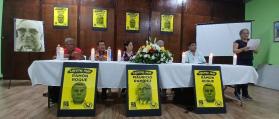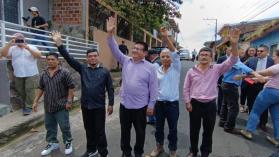Special Report: Human Rights Violations Abound in El Salvador as President Bukele Responds to COVID-19
In response to the threats posed by the COVID-19 pandemic, the administration of Nayib Bukele in El Salvador took a number of strong measures early on, such as setting up an obligatory quarantine in government-established centers for all air and land travelers returning to El Salvador and closing the airport to inbound and outbound traffic. Drastic and swift measures to prevent the spread of COVID-19 that have been deemed necessary across the globe are particularly warranted in El Salvador, given its historically underfunded healthcare system, high degrees of poverty and inequality, lack of access to clean water, and limited capacity to respond to natural disasters.
However, many of President Bukele’s subsequent actions have raised concerns. His more stringent measures in particular, such as military enforcement of a national stay-at-home order and arbitrary detention of people accused of violating the quarantine, have been denounced as exceeding the limits established by the Constitution of El Salvador.
While human rights organizations, progressive social movements, and civil society leaders in El Salvador agree that comprehensive protective and preventive measures are necessary, many are denouncing a rising tide of human rights violations stemming from the suspension of constitutional rights and use of force that has characterized the government’s response to the threat of COVID-19, as well as President Bukele’s flagrant dismissal of recent Supreme Court rulings intended to curb his detention policy.
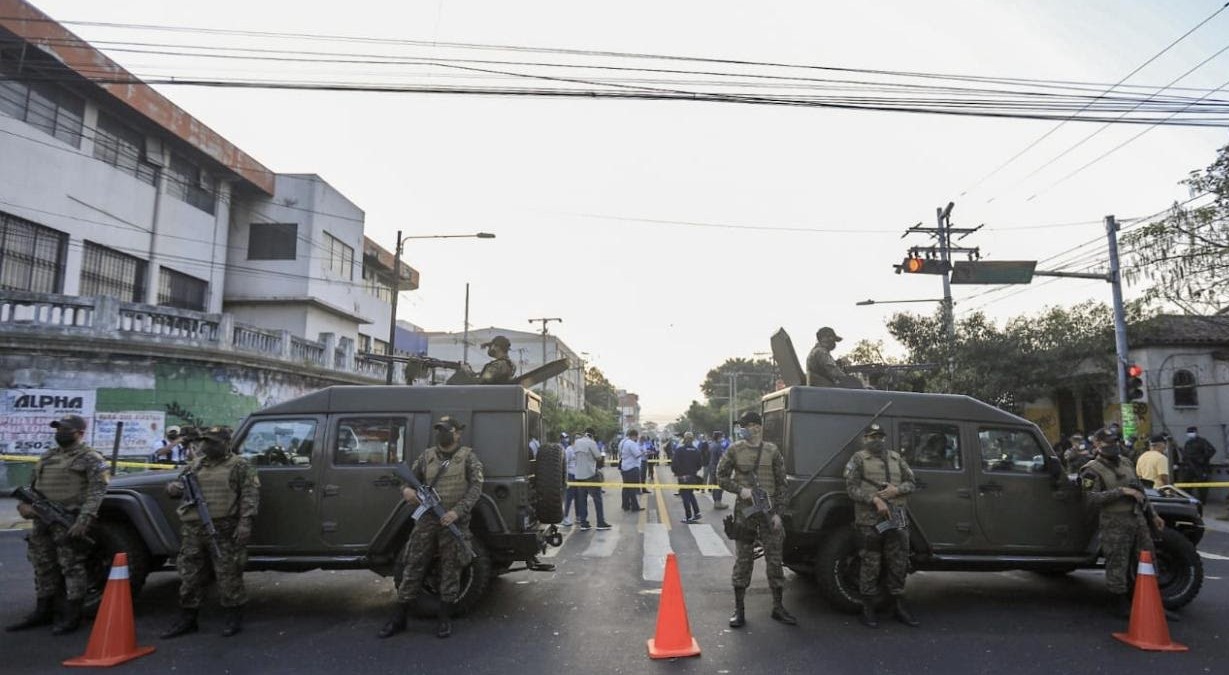
Photo from Fuerza Armada Twitter: 48-hour “cordón sanitario,” or sanitary corridor, as military closes off the nation’s capital
Quarantine centers and containment strategy threaten health and safety of those detained
A major piece of the Bukele administration’s response to the threat of COVID-19 has been to establish Centros de Cuarentena, or quarantine centers. An official COVID-19 government website reports that over 4,000 people are currently being held in 82 quarantine centers that were set-up throughout the country since early March (these numbers are updated daily).
In the days before the Legislative Assembly approved the first set of emergency measures on March 14, travelers entering El Salvador by land and air were already being taken into forced quarantine for thirty days. Many travelers only learned about this upon their arrival to the country.
Denouncements from El Salvador’s Human Rights Ombudsman’s office (PDDH) came as early as March 13 when Ombudsman Apolonio Tobar expressed concerns over the improvisation of the government's actions and the desperation and confusion this caused for travelers entering the country who lacked clear information about where they would be held.
There were also concerns of the potential for these centers to become sites of infection. As Tobar stated, “They’ve put everyone in the same room, regardless of whether they arrived from countries with cases with COVID-19 or not.”
Since the announcement of a national stay at home order on March 21, numbers in the quarantine centers swelled to over 4,600 people, many of whom were apprehended for simply being out in the street, regardless of symptoms or possible exposure.
News outlets have reported that at least two people have died due to medical negligence while staying in quarantine centers or hospitals.
Aside from banning air travel, the government has also beefed up enforcement of its borders, dispatching border patrol agents, the National Civil Police and the Armed Forces to prevent unauthorized entry. While air travel has been banned, over 800 people were nonetheless deported to El Salvador in the last month, a move that immigrant rights organizations have widely denounced.
Quarantine enforcement results in violations of human rights and constitutional law
Legislature approves emergency presidential decrees despite concerns regarding suspension of constitutional liberties
In the late evening of March 14, El Salvador’s Legislative Assembly approved two COVID-19 emergency presidential decrees. The first, declaring a State of National Emergency (Decree 593) was approved unanimously to provide direction to state institutions for how to appropriately respond to the impending COVID-19 crisis.
The second, the Law of Temporary Restriction of Concrete Constitutional Rights to Address the Pandemic COVID-19 (Decree 594) also referred to as “State of Exception Law,” gave the president power to suspend certain constitutional rights. This second decree was approved in the legislature with the support of the right-wing Nationalist Republican Alliance (ARENA), National Conciliation Party (PCN) and the Grand Alliance for National Unity (GANA). The leftist Farabundo Martí National Liberation Front (FMLN) and the smaller right-wing Cristian Democratic Party (PDC) voted against it.
The FMLN’s principal opposition to the suspension of constitutional liberties was the possibility of abuse of power by security forces in implementing the suspension. Following the vote, the FMLN’s lawyer, Ruth Eleonora López, filed a lawsuit before the Constitutional Chamber of the Supreme Court challenging the State of Exception on the grounds that the participation of substitute deputies in the vote to pass the law and the law’s disproportionate response to the pandemic are unconstitutional.
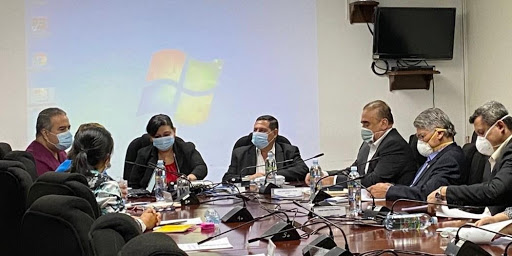
Photo from Diario CoLatino: Salvadoran legislators meeting with medical experts
President Bukele issues national quarantine, illegal detentions follow
On March 21, in a late-night televised address, President Bukele announced a strict 30-day national quarantine to limit the spread of COVID-19 (Health Decree 12). In his announcement, he also proposed disbursing $300 to people without access to formal employment, and offered a moratorium on utility payments for 1.5 million Salvadorans.
Though these measures initially earned Bukele high praise on social media, including within the Salvadoran diaspora and more broadly in the Latinx community in the U.S., the implementation did not live up to their promise, resulting in chaos and public health hazards when eligible people flooded to the distribution centers to receive financial assistance, for example.
Within hours of the national quarantine announcement, hundreds were detained by the National Civil Police and Armed Forces for violating the order and sent to quarantine centers that had been set up by the government the week before.
Since then, members of the Salvadoran National Civilian Police have detained nearly 1,400 people who they determined to be in violation of the order. Many were held in police or administrative facilities without formal charges and without having been provided a lawyer or being presented before a judge. Those detained were then sent to quarantine centers, contributing to concerns about unnecessary exposure.
A variety of public and civil society institutions have expressed concerns about human rights violations under the State of Exception and with regard to the enforcement of the quarantine.
The President of El Salvador’s Legislative Assembly claimed that the detentions were an excessive use of force on behalf of the National Civilian Police. Attorney General Raúl Melara, who initially threatened additional criminal charges and jail time for those accused of violating the stay-at-home order, later softened his stance after being challenged in the Legislative Assembly, admitting, “None of the detentions that are being made at the moment are based on criminal acts that are being committed. These withholdings are so that the Ministry of Health can exclusively decide whether to quarantine people.”
Beginning on March 27, the Constitutional Chamber of the Supreme Court issued a series of rulings declaring President Bukele’s implementation of COVID-19 containment measures to be unconstitutional. In its first of a series of decisions related to habeas corpus rights, the Constitutional Chamber ruled that people should not be detained in administrative or police facilities for violating the quarantine order.
On March 29, the University of Central America José Simeón Cañas urged the Assembly not to approve an extension of the State of Exception, which was due to expire the same day, arguing that the decree violates the Constitution and is unnecessary since the State of Emergency decree provided the legal tools to address the needs posed by COVID-19. Similarly, the human rights organization Cristosal urged the Legislative Assembly to “avoid authorizing the suspension of rights unless doing so is indispensable in the face of the pandemic.”
In response to these concerns, a new “State of Exception Law” that was approved by majority vote in the Legislative Assembly on March 29 included language upholding habeas corpus, that is, a prohibition on illegal detentions, and to improve conditions for those already detained and thereby potentially infected. Several other accountability measures were put in place, such as empowering the Human Rights Ombudsman’s office to oversee the stay-at-home order; however, the rights to freedom of movement and free assembly remained suspended and restricted.
The FMLN once again voted against the order, saying “they’d heard the demands of the human rights organizations” regarding the potential consequences of the suspension of rights. The PDC also rejected this new measure.
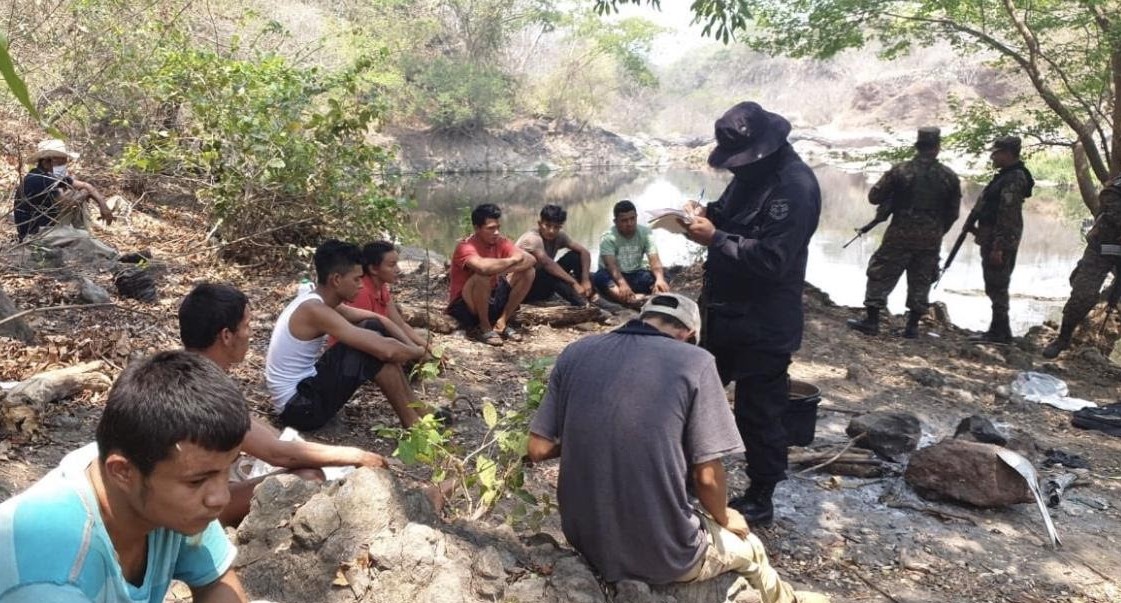
Photo from Fuerza Armada Twitter: Salvadorans accused of violating national quarantine detained at Río Grande in San Miguel
Police and armed forces continue arbitrary detentions in flagrant violation of Supreme Court ruling
In the intervening weeks, the Bukele administration has issued a series of fifteen-day stay-home-orders (Health Decree 14 on March 30, Health Decree 19 on April 14).
During his April 6 address, President Bukele ordered the police and armed forces to be more strict in their enforcement of the quarantine, appearing to disregard public criticism regarding excessive use of force. Bukele warned, “I will not mind seeing on social media that people say they seized my car, they hurt my wrist.” The executive’s Health Decree 19, which enables the seizure of vehicles of people who do not respect the home quarantine or the compulsory entry of personnel from the Ministry of Health into the homes or premises of citizens, has been questioned on the grounds that it violates rights that the Legislative Assembly has not voted to suspend. The Constitutional Chamber of the Supreme Court has ruled that constitutional rights can only be restricted or suspended by laws issued by the Legislative Assembly.
El Salvador’s Human Rights Ombudsman responded that the use of force as directed by the Executive would be a violation of El Salvador’s Constitution, which members of the police and Armed Forces are bound by oath to uphold irrespective of any other directives or decrees.
On April 8, the Constitutional Chamber reiterated its earlier directives restricting the arbitrary nature of detention and ruled that people should not be detained unless deemed infected, a blow to the President’s nationally televised directive for security authorities to use increased force when implementing the national quarantine.
In defiance of the court’s ruling, President Bukele via Twitter ordered the police and military to continue to indiscriminately detain people deemed to be in violation of the stay-at-home order and transport them to government-run quarantine centers.
Michele Bachelet, United Nations High Commissioner for Human Rights, issued a statement expressing serious concern over the “erosion” of human rights in El Salvador, concluding that “the government is failing to uphold the fundamental principles of rule of law.” She noted, “Even in a state of emergency, some fundamental rights cannot be restricted or suspended, including the right not to suffer mistreatment and the fundamental guarantee against arbitrary detention.” The Commissioner called on Salvadoran authorities to “investigate all alleged human rights abuses in the context of measures to counter COVID-19 and to immediately free all those held arbitrarily in detention after they have received medical testing.”
Regarding Bukele’s disregard for the Supreme Court’s rulings, U.S. Congressional Representative Eliot Engel (D-NY), Chairman of the House Committee on Foreign Affairs, stated, “World leaders should be able to protect both public health and civil liberties. I urge President @NayibBukele to respect El Salvador’s court rulings on #COVID19. Institutions matter.”
One of the results of this tug-of-war between President Bukele and Salvadoran state institutions is that thousands of people taken to quarantine centers may have been exposed to the virus while in detention, a fact recognized by the state’s security forces and the administration itself. In an April 2 press conference, Rogelio Rivas, Minister of Justice and Security, warned, “We ask [the citizens] to collaborate or you will have to be taken to a quarantine center, away from your families and assume the risk in these quarantine centers of contracting even the virus."
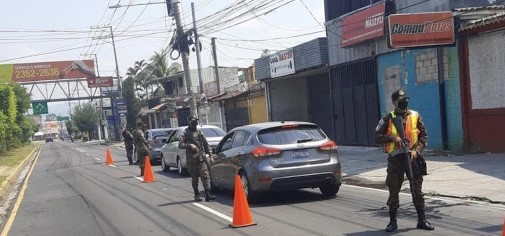
Photo from Fuerza Armada Twitter: National quarantine enforcement
Limits to public access to information, hostility toward the press, and intolerance to criticism
President Bukele and his administration's tendency to limit the public’s access to information and contempt towards members of the press have continued throughout the COVID-19 emergency.
Dozens of complaints have been filed with the Office of the Human Rights Ombudsman regarding violations of the right to access information, including reports that people in quarantine centers have been denied the results of their COVID-19 tests. The Bukele administration has also closed offices within government ministries and other state institutions charged with responding to the public's request for government information, claiming the COVID-19 state of emergency measures allow for the suspension of such administrative processes. This and other moves limiting or curtailing government transparency have been denounced for violating El Salvador's legal frameworks regarding access to public information.
Throughout the COVID-19 emergency, press conferences held by government officials have prohibited questions from the press, a practice that has been denounced as a violation of the rights of press freedom and of freedom of expression. Additionally, in response to reports of authorities forcing journalists to delete footage taken of quarantine detentions, the Association of Journalists of El Salvador reiterated a “call to security authorities to respect the free exercise of journalism, especially when journalists duly carry their credentials and are doing their job without obstructing containment measures.”
The United Nations High Commissioner for Human Rights has also responded to attacks on press freedoms in El Salvador, stating, “The dissemination of truthful and factual information about COVID-19 and the measures necessary to combat it is critical in order to avoid panic, maintain public trust and save lives. Journalists must be able to provide comprehensive information about the pandemic and the effectiveness of government measures without fear or censure. I remind the authorities that criticism is not a crime.”
A particularly emblematic example of the Bukele administration’s attitude toward the press and intolerance for criticism has been Presidential Press Secretary Ernesto Sanabria’s attacks on the Participatory Broadcasting Association of El Salvador (ARPAS), a national network of community radio stations. After ARPAS reshared an April 11 tweet from Reporters without Borders regarding El Salvador's attacks on press freedom, Sanabria accused ARPAS of being a media arm of the opposition. Many civil society organizations released statements denouncing Sanabria’s attacks against ARPAS and supporting their journalistic integrity and their work to uphold human rights.
In a similar situation, Bukele blocked José Miguel Vivanco, Americas Director at Human Rights Watch, on Twitter after Vivanco questioned some of the emergency measures taken to combat the pandemic. Vivanco stated “President Bukele acts as if any policy is justifiable to stop the spread of COVID-19, including adopting measures that have led to hundreds of arbitrary arrests. Security forces need to be subject to strict scrutiny and held accountable if they commit abuses, given their record of past and present serious human rights violations.”
These retaliatory actions reinforce concerns that the Bukele administration is using the pretext of protecting rights to life and health in order to violate other basic and fundamental rights, such as the right to freedom of expression and to public information.
Concerns about President Bukele’s disregard for the rights of women and the LGBT+ population
The concerns that several state institutions have raised echo some of the denouncements and demands coming from progressive social movement organizations and different sectors of Salvadoran civil society. Many of the concerns from feminist and LGBT+ organizations that predate the COVID-19 crisis have only intensified under this state of emergency.
In response to Bukele’s militarized approach to addressing COVID-19 in El Salvador, feminist organizations have demanded that the Bukele administration establish adequate protocols to ensure the protection of the lives of women, girls and the LGBTI community during the crisis, through measures of social protection, to ensure their livelihood and adequate attention in the government’s quarantine centers.
The Feminist Collective for Local Development has noted that the National Civil Police hasn’t been responsive to complaints of gender violence, which is especially grave considering the Attorney General has confirmed four feminicides since the shelter-in-place order was issued.
In a recent Instagram Live interview with famed hip-hop artist Residente about the country’s response to COVID-19, Bukele made several homophobic and transphobic remarks. This prompted a denouncement from the LGBTI Federation of El Salvador, demanding the President fulfill his duty to ensure the equal rights of all Salvadorans irrespective of his own personal religious beliefs.
The administration’s lax attitude towards verbal harassment towards women during the current state of emergency has also raised alarm. Women reporters, lawyers and human rights activists have decried online harassment and threats coming from Bukele appointees including the Minister of Labor and others close to him. These attacks, lodged at those who express concern or who critique the President’s measures to counter COVID-19, have taken a particularly misogynistic and transphobic tone and have been widely mimicked online by the president’s supporters.
These are not new concerns for feminist organizations in El Salvador. Early in his term, government institutions designed to provide specialized attention for women experiencing gender violence and the LGBT+ community were eliminated. Meanwhile, militarization of public security has become more prevalent. The Bukele administration’s redirection of public resources towards the military is increasingly alarming in light of his use of the military to intimidate legislators on February 9 of this year, a move that itself was widely denounced by feminist organizations in El Salvador.
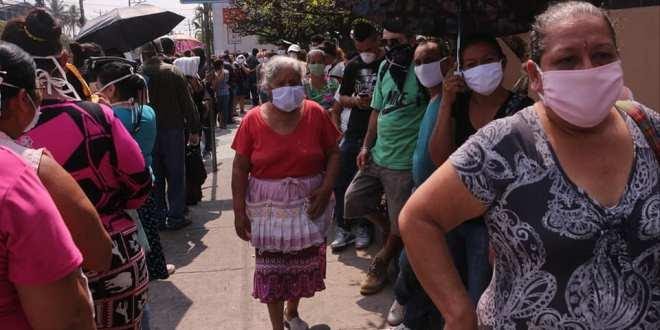
Photo from Diario CoLatino: Accompanying report of increased numbers of infections caused by community exposure as people wait in line to meet basic necessities
Concerns about obligations to foreign lenders
On March 26, the Legislative Assembly unanimously gave the green light to the Bukele administration to seek $2 billion in external financing to address the economic crisis that the pandemic will undoubtedly generate.The money is intended for use by both the national government and local mayors to, among other things, boost public investment in housing and infrastructure, guarantee food security and support small and medium-sized businesses. Enabled by the approval, the Bukele administration sought and received a $389 million loan from the International Monetary Fund, El Salvador’s first in over three decades.
Prior to the vote, the Salvadoran Popular Movement Coordination, a constellation of progressive grassroots organizations and labor unions, denounced the administration for the decision to address the crisis by taking on massive foreign debt for fear that neoliberal measures will be applied to pay it off, such as reductions in social spending, further dismantling of the pension system, privatization or concessions of remaining public services, and increasing taxes that disproportionately affect working class people, like the Value Added Tax on food.
The Bukele administration already cut $33 million from the healthcare system, despite not having presented a plan for addressing still-existing healthcare disparities in the country, which will certainly have an impact on the country’s ability to respond to this pandemic.
Private sector violates obligation to workers
Many private sector employees in El Salvador are taking advantage of the COVID-19 pandemic to thwart union organizing drives, especially in the apparel sector, where production takes place predominantly in maquilas. Garment worker unions have denounced employers’ unwillingness to pay employees for the duration of the forced quarantine, stressing that a majority of maquila sector workers are single women with children. Their status as formally employed makes maquila workers ineligible for the $300 government subsidy that those who are unemployed or work in the informal sector are eligible to receive.
Unions report that some plant managers are attempting to fire workers rather than pay them while plant operations are suspended. Union leaders also worry that some managers will use the shutdown as pretext to close factories where there are active union organizing drives.
SITRASACOSI, a garment worker union in the maquila sector, has called on multinational apparel brands to finance the payment of wages and costs during the pandemic and not discharge their responsibility onto their suppliers, let alone demand deliveries on time or penalize suppliers.
Impact of pandemic exacerbated by existing water crisis
Another source of desperation that precedes the COVID-19 pandemic and will likely exacerbate its impact is the lack of access to clean water. In El Salvador, the most water-stressed country in Central America, over 90% of potable water is contaminated and, according to past government reports, only 32% of households in rural areas have access to running water, making it difficult for many people in El Salvador to comply with even the most basic global health recommendations for preventing the spread of the virus.
The Water Forum of El Salvador, a coalition of environmental, faith and community development organizations, has urged the Bukele administration to “develop and implement in the very short term a contingency plan for the supply of clean and quality water in all the shortage areas of the country, mainly in populous areas of metropolitan San Salvador.” The Forum considers that government recommendations of frequent hand washing are irresponsible if the government is not willing to provide the water citizens need to follow them.
The Water Forum is also proposing the establishment of an emergency fund to support the 1,900 community-managed water boards across the country that provide water to the under-serviced communities, largely in rural areas. As it stands, there is no nationwide legal framework to support these community-managed water systems, which fill the gap in service that exists due to lack of adequate funding and public investment in infrastructure for the country’s publicly-managed water agency, ANDA. This fund would ensure that people in the countryside do not lose access to water during the nationwide shutdown.
The existing difficulties many Savadorans face in accessing water have been exacerbated by limitations on movement that have been imposed during the COVID-19 crisis. On Saturday, April 18, for example, members of a community water board were prohibited from traveling to their headquarters and threatened with arrest in the town of El Puerto de La Libertad, despite providing documentation that proved they were tasked with providing water to over 300 families.
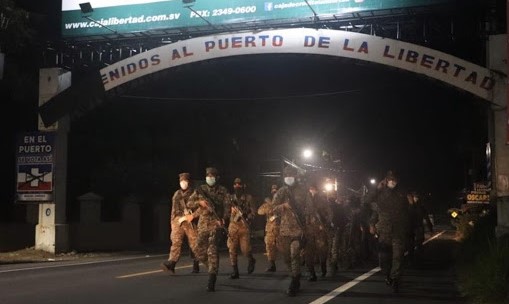
Photo from Fuerza Armada Twitter: Military deployed to the town of Puerto de La Libertad for 48-hour “Cordón Sanitario” lockdown enforcement
Conclusion
In addition to the grave health risks and threats of a devastating economic recession posed by this pandemic, El Salvador also faces an alarming erosion of democracy as a result of the administration's current approach to combating the COVID-19 pandemic. The Salvadoran healthcare system, despite having been substantially improved by the historic health reforms implemented under previous FMLN administrations (2009-2019), faces critical gaps in healthcare supply needs, such as the need for COVID-19 tests, personal protective equipment and ventilators, as is being experienced across the globe. To combat the economic decline resulting from a shutdown of almost all economic activity, the Salvadoran government has turned to international lending institutions, opening the door to a return of the vicious neoliberal economic model that caused skyrocketing poverty and inequality throughout the 1990s and 2000s that led over a million Salvadorans to flee the country.
In terms of immediate recommendations, CISPES urges U.S. Ambassador to El Salvador Ronald D. Johnson and Members of Congress to forcefully repudiate the anti-democratic behavior of President Nayib Bukele and urge respect for the separation of powers, as well as an end to the use of repressive measures to deal with a global health crisis. In the coming months, we encourage Members of Congress to utilize the appropriations process to reduce and restrict security and other funding accordingly, as failure to do so will only accelerate the worrisome deterioration of human rights in El Salvador under the Bukele administration.

 "I am a CISPES supporter because continuing to fight for social justice and a more people-centered country means continuing the dream and sacrifice of thousands of my fellow Salvadorans who died for that vision.” - Padre Carlos, New York City
"I am a CISPES supporter because continuing to fight for social justice and a more people-centered country means continuing the dream and sacrifice of thousands of my fellow Salvadorans who died for that vision.” - Padre Carlos, New York City
